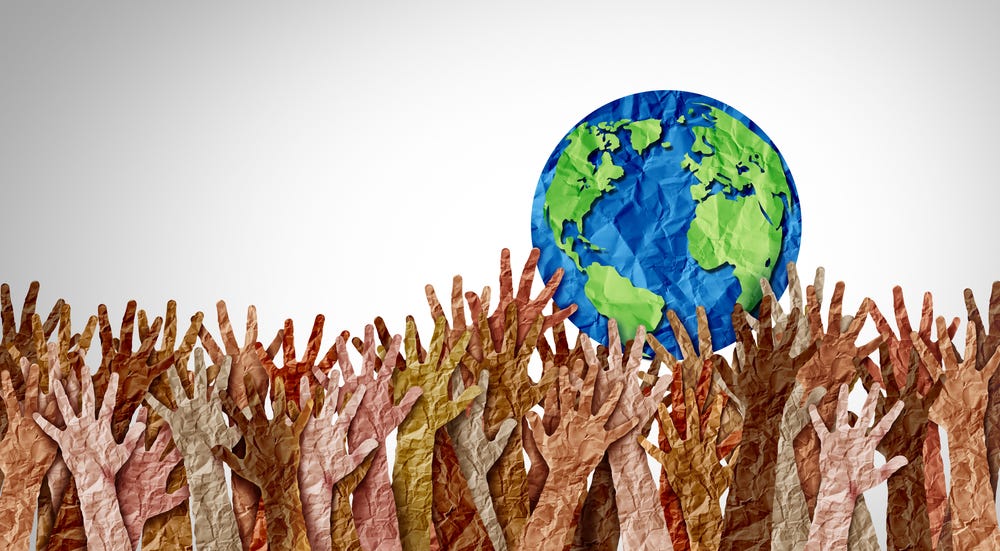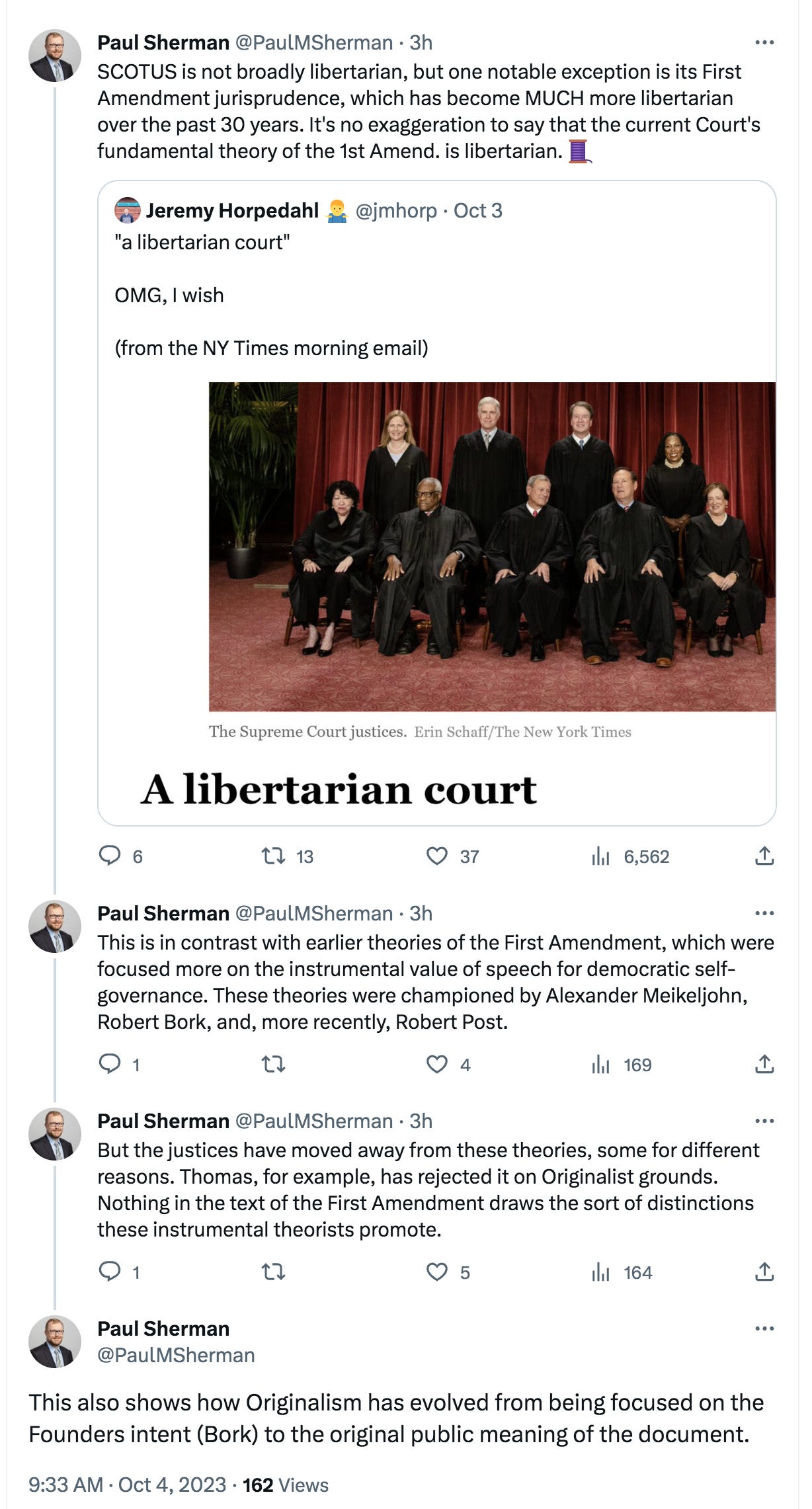E-Pluribus | October 4, 2023
Social justice drift; education or indoctrination; and the future is not as dark as it appears.
A round-up of the latest and best writing and musings on the rise of illiberalism in the public discourse:
Freddie deBoer: How Elites Ate the Social Justice Movement
Freddie deBoer grabs the reader from the get-go with this opening sentence for his essay on the social justice movement for The Free Press: “I’m a Marxist.” One might think that’s grounds to be highly skeptical of anything that might follow, but deBoer’s self-proclaimed ideology adds weight to his contention that the movement has been hijacked by elites whose concern about the average Joe is negligible in pursuit of more lofty goals.
The problem with identity politics is that any given identity is always going to be smaller than the broader possible coalition you could assemble, and almost always smaller than you need to create change.
[ . . . ]
Too often, the left today seems determined to take the opposite approach. Many people on the left seem so dedicated to dividing up the world into smaller and smaller constituencies. You might consider the narrowing of “people of color” to “BIPOC,” black and indigenous people of color. The purpose of that distinction is to underline the greater oppression that black and indigenous Americans have endured than other people of color. And they probably have. The operative question, though, is: What is the political value of dividing up progressive constituencies into smaller and smaller groups? How does that help anyone achieve any of their specific aims, including BIPOC people?
[ . . . ]
It’s Okay to Call Nonsense Nonsense
[ . . . ]
For example, there are people who earnestly believe that the phrase I see what you mean is ableist—that is, disrespectful and oppressive toward people with disabilities—because some people can’t see. This is—and I choose the word carefully—nuts.
It’s nuts in several different dimensions all at once. This prohibition insults blind people, pretends to misunderstand the way language works, and is fundamentally unserious. It insults blind people and those with reduced vision because it assumes that they are incredibly sensitive and fragile, that if they come into contact with a perfectly common turn of phrase they’ve encountered all of their lives, they will be broken by it. As is true of so many contemporary progressive norms, this prohibition belittles and condescends to the very people it ostensibly honors. I have a disability myself, a mental illness. I am not hurt or offended by people using the word crazy, because I’m not so fragile as that and because I know how language works.
Read it all here.
Heather Mac Donald: But Johnny Can’t Spell G-A-Y
Given the dismal performance of today’s math students that Heather Mac Donald details in her latest for City Journal, one wonders if these students associate a plus sign more with the term “LGBTQ+” than arithmetic. The subjugation of real education to indoctrination in political and social causes, Mac Donald demonstrates, is causing real-world harm to this and future generations.
October is itself LGBTQ+ History Month, the Los Angeles Unified School District bureaucracy has reminded what it calls the district’s “fabulous educators.” Other LGBTQ+ programming will take place throughout October, picking up where Gay Pride month left off. The goals for the so-called Week of Action are ambitious: to turn six-year-olds into budding gender and critical race theorists.
An LAUSD teacher forwarded me the district’s “toolkit” for teachers laying out that agenda. Use of the toolkit, decorated with a Black Power Fist superimposed on neon rainbow stripes, is nominally optional, but elementary school teachers who forego LGBTQ programming during the Week of Action will surely risk stigmatization. (The district did not respond to queries regarding expected classroom participation rates.)
At the Week of Action’s start, teachers should engage kindergarten and first-grade students in discussions about identity, aided by an activity called an “Identity Map.” Pupils chart their experiences of discrimination or privilege along 12 axes, including race, gender identity, sexuality, mental health, and body size. This mapping allows seven-year-olds to see themselves through the “lens of intersectionality.” Teachers then post the identity maps on the wall for a class discussion about students’ multiple “identities.”
[ . . . ]
In 2022, 61 percent of third-graders in the Los Angeles Unified School District did not meet California’s watered-down, equity-driven standard for English. Children not reading by third grade will fall further and further behind in school, since they will be ill-prepared to absorb ever more complex academic content across a range of fields.
In 2022, 59 percent of third-graders failed to meet the state’s already-low standard for math competency. Over 76 percent of LAUSD eighth-graders did not meet math standards. Eighth-grade math is a make-or-break point, after which poorly performing students become ever less likely to master the skills necessary for STEM careers or admission to selective schools.
[ . . . ]
But even if fluency in LGBTQ-speak is a school’s primary concern, how will third-graders parse the words “gender expression” and “sex assigned at birth,” much less fathom their meanings, if they can’t do basic third-grade reading? How will third-graders perform the arithmetical calculations necessary to track the ever-increasing number of LGBTQ categories served up by the LAUSD, without third-grade math skills?
Read it all.
David Masci: We Have Everything We Need
In 2020, David Masci helped launch Discourse Magazine at the Mercatus Center at George Mason University. Today, Masci writes that the challenges facing our country are still great, but that reasons for optimism are greater still, based on the foundations laid by our founders and the legacy they left us.
Amid this gloom and existential angst, it may surprise you to learn that I believe there is cause for hope and even optimism about the future. The biggest reason is that we have everything we need. By that, I mean that we have all the tools, right here and right now, not only to solve our current problems but to build a better, healthier and more prosperous future.
[ . . . ]
[I]t’s important to understand that we’ve been here before and, just as important, that we’ve come through and become stronger. Fifty years ago, our fundamental liberal values, and the system that is built upon them and underpins them, ultimately enabled us to respond effectively to many of these challenges I just outlined and set us on a better course. Nixon left office after it became clear Congress would impeach him. The American people and their leaders began to have a national debate about the proper role of government. The U.S. withdrew from Vietnam; but instead of withdrawing from the world, the country recommitted itself soon after to winning the Cold War—something it achieved a little more than a decade later.
These changes came in large part because those liberal values and the constitutional order that they gave birth to offered us repeated opportunities to self-correct. Even in those chaotic and difficult days, our commitment to open debate, to free and fair elections, and to open markets helped us rethink, reset and move forward. Throughout our history, these powerful self-correcting mechanisms have saved the U.S. from many of the calamities that have befallen other countries. They are the secret sauce of liberal democracies and the reason, in spite of our recent setbacks, we should still feel optimistic about the future.
And, believe it or not, liberal ideas and the system that arose from them are still working—just not as much as we’d like or, in some cases, as much as some of us would like to admit. In recent years, for example, our political institutions have suffered some terrible shocks, but they have proven resilient enough to continue functioning effectively. In just the past few years, our courts have helped to check the worst impulses of political leaders in both parties, from Donald Trump’s efforts to overturn the results of the 2020 election to Joe Biden’s overreach on evictions and student loans. Even amid the chaos of Jan. 6, our electoral system still functioned, with leaders from both political parties confirming the election’s winner, who duly took office two weeks later.
What’s more, Americans still enjoy the blessings of liberty. For all the talk of cancel culture and censorship, much of it valid, people still feel free to speak their minds and still do so largely without fear. And whatever you may think of the revolution in communications technology and its impact on our broader society, it has given many ordinary people a much greater platform to speak to the wider world. Our other foundational freedoms, such as the freedom of conscience and worship, the freedom to assemble and the freedom to be left alone, are also all still in place.
Read the whole thing.
Around Twitter
While attorney Paul Sherman acknowledges the Supreme Court is far from libertarian across the board, he argues in this thread (first four tweets below) that its First Amendment philosophy is an exception:
Here are a few excerpts from a very long thread from the Free Beacon’s Aaron Sibarium on Planned Parenthood’s role in the gender hormone wars:
And finally, did anyone not see this coming?










